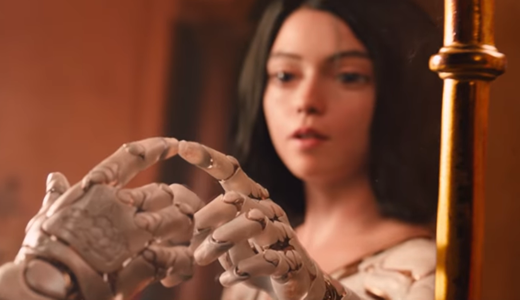Alita: Battle Angel thundered into theaters Wednesday. Like lots of PG-13 action flicks, it’s kinda good, kinda bad and kinda ugly. (Of course, you can read my review for more detail.) But oddly, one of the movie’s most powerful messages came in its first 10 minutes or so.
The world of Alita (based on a Japanese manga series) is a dystopian one set more than 500 years in the future. It’s been 300 years since a cataclysmic war now just known as “The Fall” turned civilization on its head. Only one city carries echoes of society’s glorious past—the floating metropolis of Zalem. That gleaming realm hovers over the grittier, bleaker burg of Iron City, using it as a literal dumping ground. And in the movie’s first real bit of “action,” the audience watches as Zalem pours tons upon tons of trash onto the already piled-high landfill below.
Compared to the mysterious populace of Zalem, the folks of Iron City are definitely the have-nots here. A man we seen meet there named Dr. Ido seems fairly comfortable compared to many, but the cyborg doctor/mechanic still has to comb through Zalem’s trash to find spare parts for his work: a mechanical eyeball here, a lopped-off metal limb there. He takes them all back to his clinic and recycles them—stitching them back onto his part-human, part-robot clients.
But today, Ido discovers something unexpected: the core of a cyborg girl. It doesn’t look like much, just a mechanical head and spinal cord and strangely ancient heart. But inside, the consciousness of a real person still lives. Ido marvels at his find and takes it home. And once there, he gives the core—the girl—a new body, one he once made for his own wheelchair-bound daughter.
When the girl, whom he’s named Alita (after his deceased daughter), wakes up, she has no memory of her previous life. But she, and we, soon realize that she was created for a reason. She’s pretty special, this teenage girl. And the rest of the movie is really about her finding out how special she is.
I was really struck by that image of Ido finding this girl—this wondrous creation—in the trash, discarded by a society that apparently had no use for her. This human core was chucked out with Zalem’s apple cores and soda straws.
It reminded me that, perhaps, our society’s not so different.
More than 638,000 abortions were performed in the United States in 2015, the most recent year for which we have records. While abortion rates continue to decrease, some activists and politicians seem to want to see more of them. New York recently passed a law that legalized abortion up to the moment of birth. In Virginia, legal wranglings are now in process to also ease restrictions on second- and third-trimester abortions. The state’s embattled governor has been accused by some of advocating infanticide.
Keep in mind that 90% of those born prematurely at 26 weeks—the very earliest stages of the third trimester—survive. Even some born in the second trimester, as early as 23 weeks, live. They’re not clumps of cells: They’re … babies.
But in New York, it’s now perfectly legal to throw these boys and girls out with the trash.
I don’t think you need to be religious to see the very troubling moral issues lurking behind abortion. But if you come from a Christian perspective, you can feel it all the more keenly.
In Psalm 139, we read, “For you formed my inward parts; you knitted me together in my mother’s womb.” God, we believe, had a hand in our creation—not from birth, but from conception. Before our own mothers knew we existed, God had plans for us. He gifted us with so much of who we are—not just the color of our hair and eyes, but certain inclinations of our brains and bodies. We were given gifts long before our first birthday.
Just like Alita, we were created with intentionality. With meaning. With God-given ability and, I’d like to think, a God-given purpose.
Had Ido had not been picking through the garbage when he did, maybe Alita would’ve never been rescued. Never been saved. She never would’ve been able to make use of her innate gifts or fall in love or redeem, in some way, some of the characters around her. The world of Alita: Battle Angel would be much changed without Alita in it.
And I can’t help but wonder how much our own world suffers when we confuse our own unborn with garbage.
[Editor’s Note: Focus on the Family would love it if you signed its Declaration for Life, a proclamation that, in the declaration’s own words, allows you to “be a voice for the pre-born.” Click here to read more and sign.]






Recent Comments